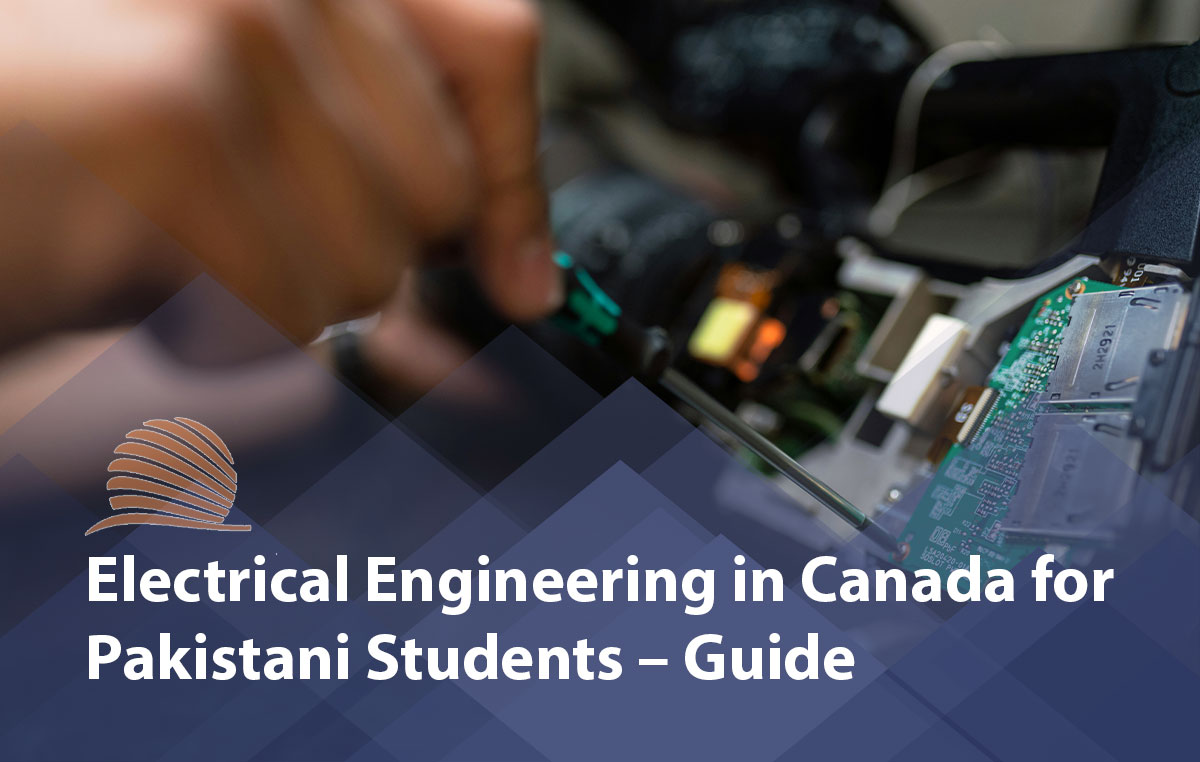Electrical Engineering in Canada

Study abroad expert advice
Don't waste time! just fill the form to get help.
Electrical Engineering is a popular field of study in Canada because of its focus on innovation, research, and collaboration with industry. Canadian universities give students a solid understanding of the basics, along with opportunities for practical experience through co-op programs and lab work. Pakistani students will find a welcoming, multicultural atmosphere, degrees recognized around the world, and many career options after graduation. Canada's modern campuses, many specializations, and close ties to industry make it a great place for future electrical engineers to study.
Why Study Electrical Engineering in Canada?
- Globally esteemed universities known for their top-tier electrical engineering programs and advanced research labs.
- Areas of focus cover power systems, microelectronics, telecommunications, robotics, and renewable energy sources.
- Excellent professional opportunities exist in technology, energy, automation, and other fields both in Canada and around the world.
- Campus life is multicultural, and students from all over the world form supportive groups.
- Generous employment regulations allow for part-time work throughout study and post-graduate work permits (PGWP) after graduation.
Top Universities for Electrical Engineering in Canada
| University Name | QS Subject Ranking 2025 | Approx. Tuition Fees (CAD/year) |
|---|---|---|
| University of Toronto | #10 | 58,000 – 62,000 |
| University of British Columbia | #19 | 41,000 – 50,000 |
| McGill University | #34 | 45,000 – 52,000 |
| University of Waterloo | #45 | 42,000 – 55,000 |
| University of Alberta | #81 | 20,000 – 30,000 |
| University of Calgary | #110 | 20,000 – 28,000 |
| Queen’s University | #130 | 40,000 – 48,000 |
| McMaster University | #150 | 30,000 – 40,000 |
Admission Requirements
For Bachelor’s Programs
- Academic background: Successful completion of secondary education, including 12 years of schooling, with grades above 60% in Physics, Chemistry, and Mathematics, is expected.
- Standardized tests: Many higher education institutions no longer mandate the SAT for admissions, though some still do.
- English Proficiency: IELTS 6.5–7.0 or TOEFL 80–100.
- Documents Required: academic transcripts, letters of recommendation, statement of purpose, CV/resume, and a copy of your passport.
For Master’s Programs
- Academic background: Bachelor's degree in a related discipline with a minimum GPA (often 3.0-3.5/4.0 scale).
- Standardized tests: Some universities may demand GRE.
- English proficiency: IELTS 6.5 or TOEFL 80-100.
- Documents: Academic transcripts, GRE (if applicable), English proficiency test results, letters of recommendation, statement of purpose, CV/resume, and proof of finances.
Application Process
- Research Universities: Compare rankings, tuition, faculty, research facilities, and specialization areas.
- Test Preparation: Take English proficiency exams (and, if necessary, the SAT or GRE).
- Gather Documents: academic records, test scores, SOP, LORs, CV, passport, and financial records.
- Apply online: Use the university's website or application system to submit your application.
- Interviews: Some programs may need interviews either online or in person.
- Acceptance Offer: If accepted, you will receive an admission letter.
- Visa Application: Along with your admission and financial documentation, apply for a Canadian study permit.
- Travel and Enrollment: Make lodging arrangements, book flights, and attend orientation.
Student Visa Requirements
- Type of visa: Canadian Study Permit (full-time academic studies).
- Documents: Admission letter, proof of funding, passport, completed visa application, visa fee payment, pictures, and any other documents asked by the embassy are all required.
- Visa interview: This may be necessary at the Canadian Embassy or Visa Application Centre in Pakistan.
Costs: Tuition and Living Expenses
| Expense Type | Estimated Annual Cost (CAD) |
|---|---|
| Tuition (Undergrad) | 20,000 – 60,000 |
| Tuition (Graduate) | 18,000 – 55,000 |
| Living Expenses | 10,000 – 15,000 |
| Health Insurance | 600 – 900 |
| Books/Materials | 800 – 1,500 |
| Miscellaneous | 2,000+ |
Scholarships and Financial Aid
- International students can apply for scholarships at Canadian universities depending on their merit or need.
- Consider national programs such as the Vanier Canada Graduate Scholarship, the Canadian Commonwealth Scholarship, and engineering scholarships.
- Apply early and make sure you meet all of the qualifying requirements for consideration.
FAQs
Are Canadian electrical engineering qualifications recognized internationally?
Yes, degrees in engineering from Canada generally have a solid international reputation, which can aid entry into academic or professional roles.
Can I hold a job while studying in Canada?
If you are an international student, you can work up to 20 hours a week during school semesters and full-time during allotted breaks.
What are some popular areas of focus for Electrical Engineering in Canada?
Fields of study consist of power and energy, telecommunications, embedded systems, microelectronics, robotics, and renewable energy.
What kind of work can I get after graduating?
Upon graduation, you could be eligible for a Post-Graduation Work Permit (PGWP), which lets you gain up to 3 years of work experience in Canada.
Can students from Pakistan get scholarships?
The majority of scholarships consider all international students. Some schools might have specific arrangements that give preference to students from certain areas, like Pakistan.

 Scholarships 2026 – Fully Funded Oxford Degrees (5).jpg)
 Scholarships 2026 – Fully Funded Oxford Degrees (4).jpg)
 Scholarships 2026 – Fully Funded Oxford Degrees (3).jpg)
 Scholarships 2026 – Fully Funded Oxford Degrees (2).jpg)